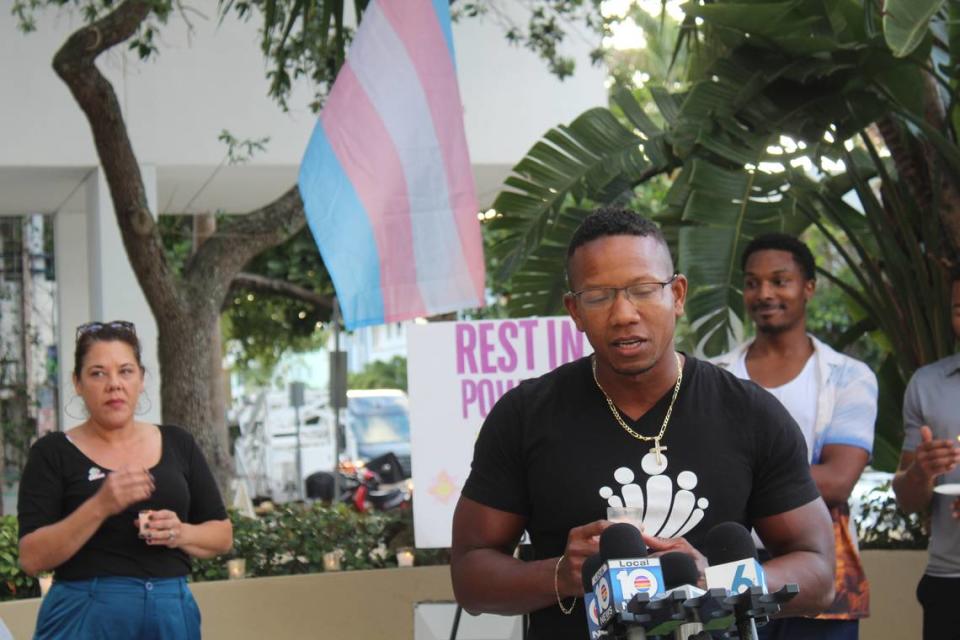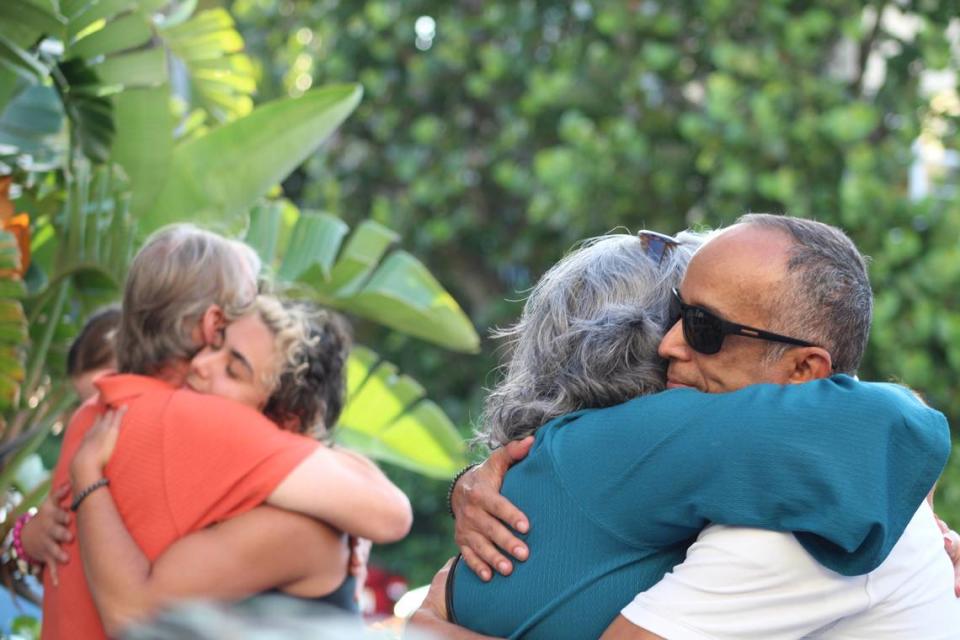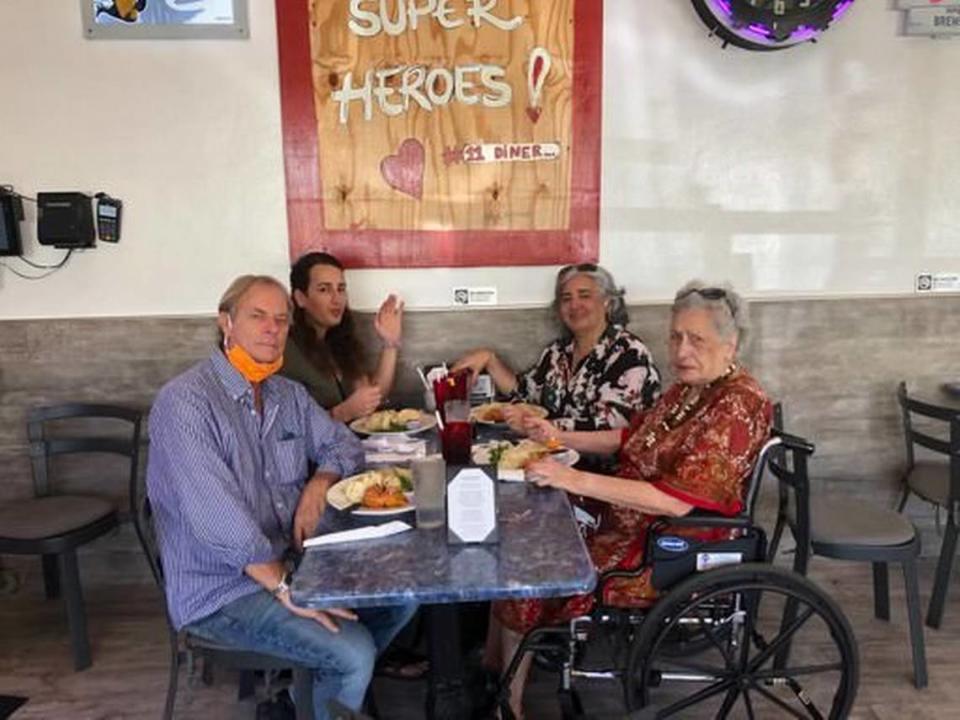Advocates say killing of trans woman highlights shelter needs of Miami LGBTQ community
- Oops!Something went wrong.Please try again later.
Andrea Doria Dos Passos felt safe at Pridelines.
At the LGBTQ support center in South Beach, where staff knew her as “Maggie,” Dos Passos could put down her bags, shower, eat and listen to music. After first visiting the center earlier this year, she began coming in nearly every day until she was violently killed while sleeping outside the Miami City Ballet last week.
But while Pridelines became like a second home for Dos Passos, finding permanent housing for the 37-year-old transgender woman proved challenging.
Edward Summers, the executive director of Pridelines, said he and other staffers tried to connect Dos Passos with shelter beds, but she repeatedly declined, saying she didn’t want to be bound by the curfews and other restrictions that shelters typically impose. Such spaces, Dos Passos told Summers, wouldn’t allow her to fully be herself.
“She was really a free spirit and wanted to just live her life on her terms,” Summers said. “She really didn’t like the rules and regulations of some of the places we have here in South Florida and Miami.”
READ MORE: ‘Being her authentic self.’ Family, community honor brutally slain Miami Beach woman

The exact circumstances surrounding Dos Passos’ gruesome killing are still under investigation. Gregory Fitzgerald Gibert is facing a first-degree murder charge in the death of Dos Passos, who was beaten to death with a pipe as she slept next to the ballet auditorium in Miami Beach. Police say they have yet to discover a motive.
But advocates for the homeless and LGBTQ populations say the tragedy underscores the need for shelter that caters to the LGBTQ community and keeps its members safe. Summers said Miami-Dade County doesn’t have any shelters specifically for LGBTQ people.
“The system failed because we do not have adequate housing, or any housing, for LGBTQ members in our community in Miami-Dade County,” Summers said. Several of his clients have left shelters, he said, because “they didn’t feel safe, they felt harassed, they felt like they had to be somebody they weren’t.”
Dos Passos’ stepfather, Victor Van Gilst, said Dos Passos had been struggling with her mental health since she was around 25 and lived at various points with him and her mother, Ana, at their Coral Gables home.
Dos Passos was living in San Francisco when she transitioned three or four years ago, Van Gilst said, and also spent eight months at Agape, a Miami nonprofit that offers a residential treatment program for women struggling with substance abuse, mental illness and co-occurring disorders.
She then moved to a halfway house in Miami Gardens, but the house was sold and she ended up back on the street. About a week before her death, Dos Passos was discharged from the psychiatric unit of Mount Sinai hospital in Miami Beach, according to Van Gilst.
“She didn’t want to be locked up,” Van Gilst said. “I believe the system failed Andrea.”
Miami Beach spokesperson Melissa Berthier said the city’s homeless outreach team and a contracted provider, New Hope, had engaged with Dos Passos in two documented instances but that she “declined services.”
Dos Passos’ mother said she had asked her daughter if she wanted to return to her Coral Gables home but that Dos Passos told her she “wanted to be free.”
“She wanted to be on the beach. She wanted to swim,” Ana Van Gilst said.

Dangers of homelessness
Multiple Miami nonprofits are seeking to establish housing for the LGBTQ community. SMASH, an affordable housing organization, has been looking to construct a three-unit building for LGBTQ youth in Liberty City on property purchased through a community land trust in 2018.
“Nobody prefers to be on the street, but it is terrible that in certain situations people choose to stay on the street because the shelter environment is extremely oppressive,” said SMASH founder Adrian Madriz. “Trans folks in general find that staying in a shelter can be a hostile environment.”
High-profile incidents of violence against unhoused people highlight the dangers of living on the street, Madriz said. An analysis published last year found the mortality risk for non-elderly homeless people in the United States is three-and-a-half times that of those who are housed.
“If she would have had a place to stay, this most likely would not have happened,” Madriz said of Dos Passos. “People are forced to make desperate decisions because they have hardly any choices available to them.”
Some local shelters have taken steps to be more responsive to the LGBTQ community and to transgender and nonbinary people in particular. Summers said Pridelines frequently refers clients to Camillus House, which he said has been sensitive about placing people in beds that correspond with their gender identity.
Lotus House, the largest women’s shelter in Miami-Dade, has an initiative aimed at providing counseling and other support to members of the LGBTQ community. The facility is “best equipped” among shelters in the county to provide those types of services, said Miami-Dade County Homeless Trust Chairman Ron Book.
But Book said he doesn’t expect any new shelters to be created for the LGBTQ population. He is focused on creating more permanent housing with supportive services to take unhoused people off the street for good.
“We will not be creating any new shelters in our community, period,” Book said, adding that, “at this point, I don’t know that we have a problem making sure that those in the LGBTQ [community] are getting placed.” Still, Book said Dos Passos’ killing would prompt him to take a closer look.

‘A lack of trust’
Miami Beach City Commissioner Alex Fernandez said the case shows there’s a need for improvement.
“If they’re doing it, they’re not doing it right,” Fernandez said of the shelters’ efforts. “Otherwise, individuals like Andrea wouldn’t have been in the streets.”
In an email to residents after Dos Passos’ death, Fernandez said he wants police to more strictly enforce city laws that subject homeless people to arrest if they decline an available shelter bed — a controversial approach that advocates say unfairly criminalizes homelessness. Fernandez said in an interview that the effectiveness of the approach depends on the city engaging consistently with unhoused people and making sure their needs are met.
“The goal is not to arrest, the goal is to get vulnerable individuals like Andrea into a safe space,” he said. “I wish she would have been engaged more by the city of Miami Beach. That’s a failure on our part.”
READ MORE: DeSantis praised a Miami Beach homeless law. Is it as ‘compassionate’ as the mayor says?
Advocates said the challenge goes beyond the availability of shelter and housing. Many transgender and nonbinary people don’t trust the systems in place because of discrimination they’ve experienced, said Audrey Aradanas, the deputy director at nonprofit Miami Homes for All.
“There’s a lack of trust in the community,” Aradanas said. “There’s not enough safe spaces for trans and nonbinary individuals to come forward to talk about the needs they might have.”
Madriz, the SMASH founder, said what happened to Dos Passos is a clear sign that change is needed.
“I think we as a society need to look critically at our actions and our policies and our lawmaking,” he said. “This is plain evidence. She’s dead.”
Miami Herald staff writer Devoun Cetoute contributed to this report.

